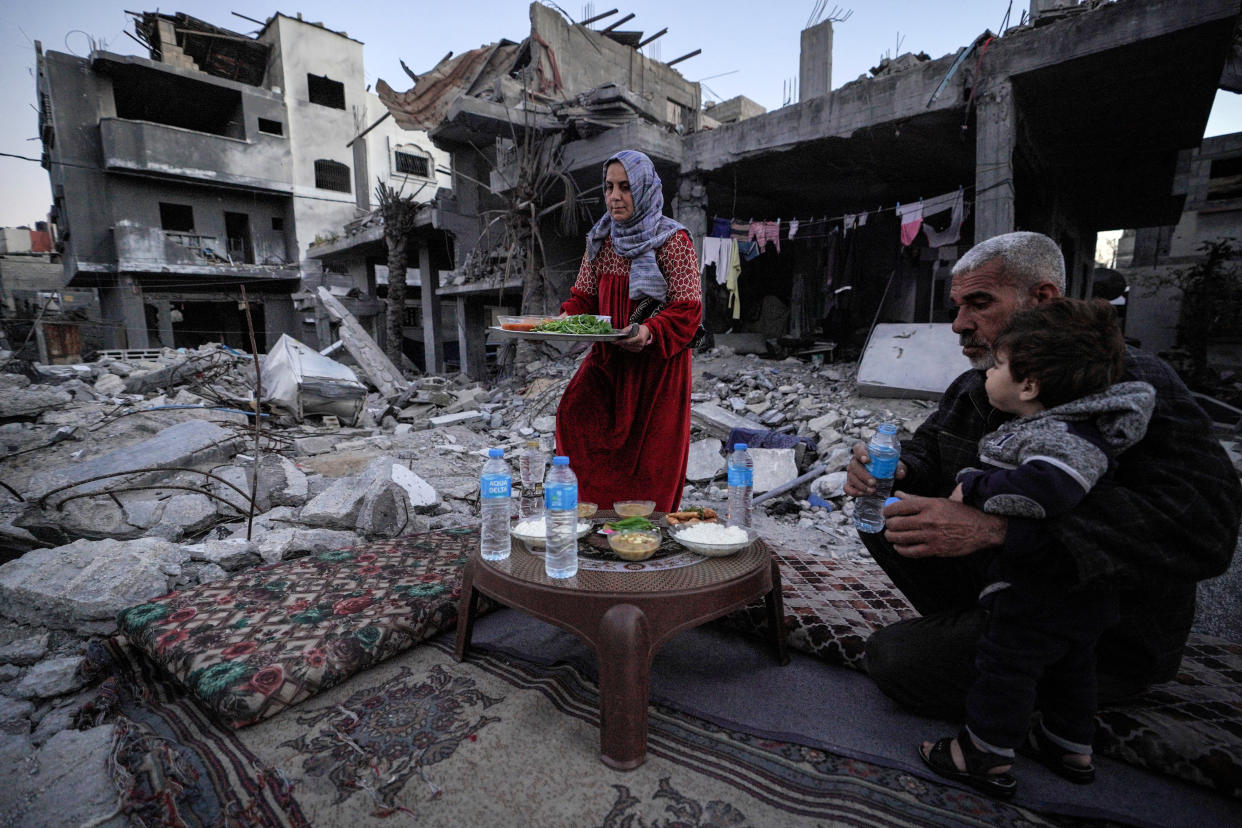Biden contradicts himself on Gaza 'red line' — and 3 other things to know as Ramadan begins with no ceasefire

Muslims around the world on Monday marked the start of the holy month of Ramadan, a time for fasting, feasting with family, prayer and giving.
But the Israel-Hamas war is casting a deep shadow over the Muslim holiday for Palestinians in Gaza who don’t have access to basic human necessities.
"The usual traditions of Ramadan are impossible in these conditions," said NPR’s Aya Batrawy.
According to United Nations officials, a quarter of Gaza’s population is on the brink of famine. The Biden administration has announced plans to build a floating pier off the coast of Gaza in order to deliver more aid to the enclave, following aid airdrops from U.S. military cargo planes. Israel has blocked aid deliveries by land, which U.S. officials have acknowledged would be far more effective.
President Biden has become increasingly critical of Israeli Prime Minister Benjamin Netanyahu in recent days as ceasefire talks between Israel and Hamas have reached a stalemate.
🇺🇸 What Biden said
Rafah is a southern city in Gaza along the Egyptian border, where more than a million Gazans have sought refuge since Israel’s ground invasion started in the northern part of the enclave.
Biden was asked in an MSNBC interview on Saturday whether an Israeli ground invasion of Rafah would be a “red line” for him.
“It is a red line,” the president responded, though he appeared to quickly backtrack his comment. “But I'm never going to leave Israel.”
“The defense of Israel is still critical,” Biden continued. So there's no red line [in which] I'm going to cut off all weapons so they don't have the Iron Dome to protect them.”
Biden was also disapproving of Israeli Prime Minister Benjamin Netanyahu’s military strategy.
“In my view, [Netanyahu’s] hurting Israel more than helping Israel,” Biden said, referring to the ongoing military assault on Gaza. “It’s contrary to what Israel stands for, and I think it’s a big mistake. So I want to see a ceasefire.”
Following his State of the Union address last week, Biden was caught on a hot mic telling Colorado Sen. Michael Bennet that he told Netanyahu "you and I are going to have a 'come to Jesus' meeting" about the regarding the conflict in Gaza. Asked by a reporter Monday whether he'd scheduled such a conversation with the Israeli Prime Minister, Biden said he hadn't, but indicated that it's still an option.
"We'll see what happens," Biden said.
🇮🇱 What Netanyahu said
Netanyahu has made clear that he intends to defy Biden’s so-called red line by launching an invasion of Rafah.
“We'll go there. We're not going to leave them,” Netanyahu said in an interview on Sunday with Politico’s parent company, Axel Springer, referring to the roughly 134 hostages, of which 100 are still believed to be alive, in Gaza following the Oct. 7 attack by Hamas. “You know, I have a red line. You know what the red line is? That October 7 doesn't happen again.”
🔎 What a Rafah invasion would mean for Gazans
Humanitarian relief organizations, like the United Nations and the World Health Organization, have forewarned that an invasion of Rafah would mean widespread civilian casualties. It would also add to the mounting Gaza death toll that is well over 30,000, according to the Hamas-run health ministry.
German Foreign Minister Annalena Baerbock said last month a Rafah invasion would be “a humanitarian catastrophe.”
❌ Ceasefire talks stalled
Ceasefire negotiations appear to have stalled between Israel and Hamas, dashing the hopes of mediators Egypt, Qatar and the U.S., who were hopeful that a pause in fighting would come at the start of Ramadan.
Netanyahu told Axel Springer that he dismissed the idea of a ceasefire for the Muslim holy month saying, “Without a release [of hostages], there’s not going to be a pause in the fighting.”
What Israel wants: In order for the war to end, Israel says it must eradicate Hamas’s military and governing capabilities in Gaza. A key goal is the return of all the hostages taken in the deadly Hamas-led rampage on Israel on Oct. 7.
What Hamas wants: A more permanent end to the fighting in Gaza, the withdrawal of Israeli forces, an influx of humanitarian aid to Gazans and the release of Palestinian prisoners being held in Israeli jails.
Hamas political leader Ismail Haniyeh blamed Israel for the stalled ceasefire talks in a televised speech on Sunday saying that Israel “wants to get its prisoners back and then resume the war on our people.”


